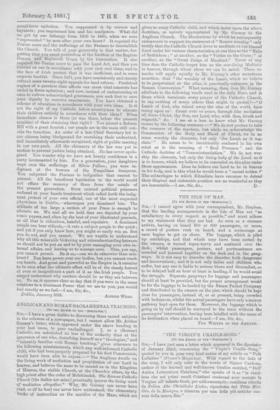ANGLICAN AND ROMAN SACRAMENTAL TEACHING. [TO TSB EDITOR Or THE
" srseratea."] Sfa,—I have a great dislike to discussing these sacred subjects in the columns of a newspaper, but I cannot allow Mr. Archer Gurney's letter, which appeared under the above heading in your last issue, to pass unchallenged. I, as a (Roman) Catholic, am astonished no less at the audacity than at the ignorance of one who, describing himself as a" theologian," and " tolerably familiar with Roman teaching," gives utterance to the following misstatements, which any well-informed Catholic child, who had been properly prepared for his first Communion, would have been able to expose :—" The Anglican dwells on the living work of mediation and propitiation of our Lord in heaven, and believes the same to be carried on in the Kingdom of Heaven, the visible Church, at the Church's altars, by tho high priest after the order of Melchizedek. The Roman Catholic Church the italics are mine] practically ignores the living work of mediation altogether." Why, Mr. Gurney can never have read, or (if he has) can never have understood, the elementary books of instruction on the sacrifice of the Mass, which are given to every Catholic child, and which insist upon the above doctrines, so naïvely appropriated by Xr. Gurney to the Anglican Church. The illustrations by which he subsequently endeavours to support his statement of " Roman worship " only testify that the Catholic Church loves to meditate ou our blessed Lord under his various characteristics, at one time as the " Babe of Bethlehem ; " at another, as the " Victim on the Cross ; " at another, as the " Great Judge of Mankind." Never at any time does the Catholic forget him as the ever-living Mediator in heaven, through whom alone we can be saved. These re- marks will apply equally to Mr. Gurney's other monstrous assertion, that " the • worship of the Lamb, which we believe to be perpetuated at the altar, is practically unknown in the Roman Communion." What meaning, then, does Mr. Gurney attribute to the following words used in the daily Mass, and in those which terminate every prayer of the Catholic Church, to say nothing of many others that might be quoted ?—" 0 Lamb of God, who takest away the sins of the world, have mercy upon us ! Grant unto us peace, through (the mediation of) Jesus Christ, thy Son, our Lord, who, with thee, liveth and reigneth," Sze. I am at a loss to know what Mr. Gurney means by the following sentence :—" We do not profess to take the measure of the mystery, but while we acknowledge the Communion of the Body and Blood of Christ, we in no sense worship the elements, but only 'the Lamb as it was slain.' " He seems to be inextricably confused iu his Mn mind as to the meaning of " Real Presence " and the Catholic doctrine of "Transubstantiation." We do not wor- ship the elements, but only the living body of the Lamb as it is in heaven, which we believe to be concealed on the altar under those appearances. Does he believe our Lord to be in heaven in his body, and is this what he would term a " carnal notion The subterfuges to which Ritualists have recourse to defend their illogical and untenable position are as wonderful as they


































 Previous page
Previous page